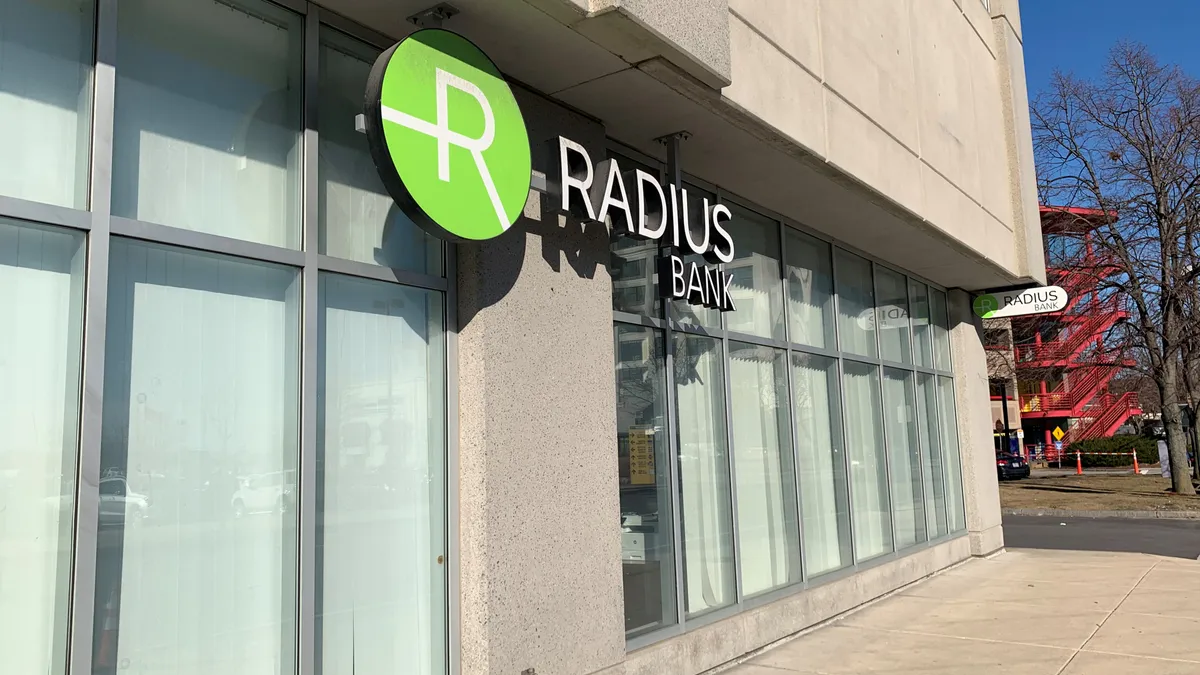LendingClub President Steve Allocca and Radius Bank CEO and President Mike Butler are upbeat and optimistic on the heels of their game changing announcement.
The two companies announced last week that LendingClub plans to buy Boston-based Radius Bank in a cash-and-stock transaction valued at $185 million.
As the first fintech purchase of a bank, the deal would give the two companies an opportunity to forge a new path in the industry, one that has fintechs stepping up as central players in the financial services space. Experts say the acquisition could also usher in a flood of other fintech-bank purchases.
In a wide-ranging interview with the pair, the two executives told Banking Dive they don’t foresee any pushback from regulators or any significant post-merger complications associated with integrating the two companies’ platforms or IT.
This interview has been edited for clarity and brevity.
BANKING DIVE: How did this deal come about?
STEVE ALLOCCA: For LendingClub, three quarters ago, we made it our strategic priority to obtain a bank charter. We've been working now for over a year on parallel paths. We submitted an application to the [Office of the Comptroller of the Currency] for the de novo process for a national bank charter and simultaneously really scoured the earth, the thousands of banks for the right acquisition or merger candidates. Radius clearly was a head and shoulders above every other alternative path that we evaluated. And like I said, we looked at them all. And it's primarily because Radius is not a regular bank.
Of the thousands of banks that we looked at, Radius is one of only 13 digital banks that feature a national footprint and no legacy branch network, with a culture of innovation.
They're a digitally native mobile first bank that's built a franchise with a strength on the deposit side that's a perfect complement for LendingClub.
Was this kind of acquisition part of Radius Bank’s long-term strategy?
MIKE BUTLER: I think as we thought about our strategies over the next two to three years, we have been successful in building this kind of forward-looking bank that had great growth opportunities. We've got the strategic partnership business that we've developed with fintechs. We've got our direct to consumer and direct to small business digital platform that we had the opportunity to grow dramatically.
So I think that the strategic thinking was, how does this company leverage and scale the businesses that we built? And that was our next strategic thinking. There's a whole bunch of ways that we could do that. And, frankly, [LendingClub CEO] Scott Sanborn and I had an opportunity to talk in August. And we were talking about the strengths of both companies. And it kind of evolved into a very interesting conversation about partnering.
And I think, from our perspective, for our employees and our clients, the opportunity for us to scale these businesses that we built here is very important to us and to do that inside the LendingClub infrastructure and inside their capital houses is outstanding for us.
Mike, what will your role be moving forward?
BUTLER: I think what's most important is that I am firmly committed to the company and being a teammate of Steve and others in the LendingClub environment. We expect to and will keep our Boston office here for a lot of great reasons. We're in the innovation district. This is where the talented people are, that drive primarily our depository products. So that is an important part of it. It's also helpful for LendingClub to develop a more East Coast presence. But it's not about me, let's just put it that way. It's about what we will all do together to create this great opportunity. And I'm looking forward to being a part of it.
What will happen to Radius’s branding? Will there be a name change?
ALLOCCA: First of all, the next 12-15 months are going to be focused on gaining all the regulatory approvals. And after that, there will be a period of integration and I think we're going to look for all kinds of different ways to be able to gain the most out of these two extremely complementary businesses coming together. A lot of those decisions we have not made at this point in time. I think it's a little premature considering we've got the next 12-15 months to focus on obtaining regulatory approval and focus on integrating these two great companies.
What are regulators going to be looking at as they consider this deal?
BUTLER: This is a pretty standard approval. Steve's been a part of the banking industry and has done acquisitions. And I surely have as well in my career. What they expect to find are safe and sound banking practices, and good controls in place, a great understanding of the regulatory environment and a high degree of respect for it. … I think, based on LendingClub's activities in the marketplace and selling loans to banks, there's a great deal of oversight from traditional bank-based regulators that they work with. I think part of the cultural connection that Scott and I had early was that deep respect for the regulatory environment. We understand we have to operate within it and I think we fully expect that the regulators will find that to be the case when they come in and do their work.
What we're excited about is the fact that all of the regulatory agencies have developed these Offices of Innovation and made clear statements that they want to participate in the ever-changing landscape of the industry and the future. And [OCC Chief Innovation Officer] Beth Knickerbocker has been a big partner of ours as it relates to our work on digital banking. So we expect this to be a well-understood transaction. And from all of the boxes, we surely spend time checking the boxes on whether this is going to get approved or not, and we feel a high degree of confidence.
Do you expect any divestiture requirements from regulators?
ALLOCCA: The short answer is, no. Unlike a lot of what are more typical traditional bank acquisitions that rely on cost savings synergies, this is really more of a, as Mike likes to say, "one plus one equals three" opportunity. ... In short, we expect both companies to operate much like they are today and then we're going to be increasingly focused on the growth opportunities from bringing them together.
BUTLER: I think there's an incredible positive momentum and energy that comes from the fact that we don't have to look to cost reductions, closing offices, divestitures or anything like that. It's all about how we can do more of what we're doing by working together. There’s very powerful energy inside the two companies related to that.
What about merging the two platforms and IT? What will be the challenges there?
BUTLER: I'm going to give this a shot, but you're slightly above my pay grade on this one. Generally speaking, we don't do any consumer loans. So we don't have a consumer loan platform. That's the cool part of it. And LendingClub doesn't have a depository platform. So the key elements of what we're going to do together is more about getting the clients access to them than changing any platforms. There might be an HR system that we put together, but from a technology roadmap, we have a lot of fun ahead of us, but surely no complicated integrations over the next 12 months or so.
ALLOCCA: I would add, we were actually talking to the Radius team about providing, through their banking-as-a-service offerings, a white label LendingClub deposit account, even before contemplating a transaction here.
BUTLER: I’m going to go one step further, because you're asking a really interesting question. One of the things we've talked about as we strategically thought about bringing the two companies together is that none of us operate on old school legacy systems that inhibit us from providing that customer experience that's being demanded out there today.
So the fun part of this IT strategy moving forward will not be, "How do I get out of my old systems? How do I get out of these antiquated platforms that were based on brand experiences and move to a digital one?" We've already been there. So our opportunity to deliver that customer experience in an even more advanced way is going to be an advantage for us as we come together.
Do you think we’ll see more of these kinds of deals — fintechs buying banks?
ALLOCCA: Speaking from the experience of the past couple of years, for us at LendingClub, there's nothing easy about this path or any path. I think that there are benefits that are unique to the combination of these two business models and these two companies that would be very hard to replicate, but I certainly wouldn't be surprised if others take a closer look at this path.
BUTLER: I'm a little bit more bullish on that and I would tell you that I'm convinced that we are just first to go down this path. As fintech organizations look to the path to profitability and as bankers look to advancing their product offerings with a fintech-like product, there's going to be activity around this. I'm not going to be surprised if over the next couple of months we hear about other marriages that would take place between companies like this.













